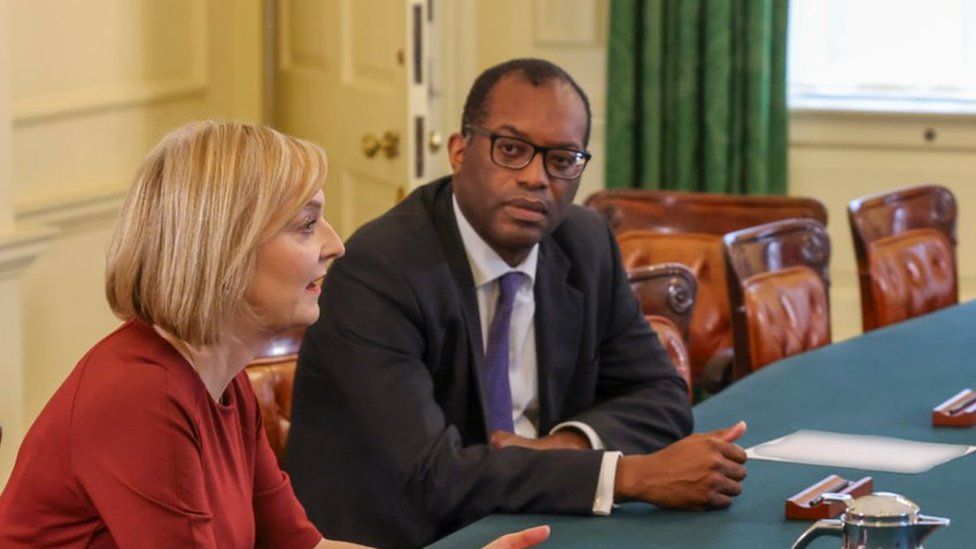ARTICLE AD BOX
 Image source, Number 10
Image source, Number 10
Chancellor Kwasi Kwarteng will pledge to "turn the vicious cycle of stagnation into a virtuous cycle of growth", as he unveils his mini-budget.
He is expected to announce the biggest tax cuts since 1988, to be funded by a sharp rise in borrowing.
It is being seen as a major change of direction for the government under new Prime Minister Liz Truss.
In a departure from Boris Johnson's economic policies, Mr Kwarteng will scrap plans to push up taxes to pay for public services with the aim of kick-starting the UK's sluggish economy.
In a statement to the Commons at 09:30 BST, he is expected to say: "Growth is not as high as it needs to be, which has made it harder to pay for public services, requiring taxes to rise.
"This cycle of stagnation has led to the tax burden being forecast to reach the highest levels since the late 1940s.
"We are determined to break that cycle. We need a new approach for a new era focused on growth."
The government normally releases an independent forecast of how major tax changes will impact the economy, but Mr Kwarteng has opted not to do this, as it his statement is not technically a Budget.
The Institute for Fiscal Studies think tank has published its own analysis, saying: "The government is choosing to ramp up borrowing just as it becomes more expensive to do so, in a gamble on growth that may not pay off."
But Minister Simon Clarke insisted it was not a gamble and that tax cuts had boosted economic growth in the past.
The levelling up secretary told BBC Breakfast people would see "increased economic activity in 2022 and through the course of 2023, showing a sharp upward trajectory in UK growth".
The mini-budget will fulfil promises to reverse the rise in National Insurance payments introduced by Boris Johnson to pay for social care and tackle the NHS backlog.
The planned corporation tax increase from 19% to 25% and the cap on bankers' bonuses are also expected to be scrapped.
The chancellor is also expected to announce an increase to the threshold people in England start paying stamp duty on home purchases, likely to £250,000.
There are likely to be changes on income tax and the Treasury has confirmed allocated investment zones will see tax cuts for business and relaxed planning rules to encourage house building.
The statement is also expected to include details of how the government will fund the energy price cap for households and businesses
The pledge to cap the typical household energy bill at £2,500 a year alone is estimated to cost as much as £150bn.
Today is the new government telling us all economic plans have changed. Gone are higher taxes to pay for public services. Instead, the new regime is focussed on cutting tax and regulations (although remember, the party in power hasn't changed).
This is likely to be the biggest tax-cutting event since 1988, according to experts.
We know national insurance rises are being reversed, corporation tax increases are being cancelled.
It's likely there will be changes to stamp duty in England, meaning people pay less tax on home purchases. There have been conversations in Conservatives circles about changes to income tax - details haven't been confirmed but it's one to watch later.
There will be changes to regulation too; liberalised planning rules in allocated investment zones and it's likely the cap on bankers bonuses will be officially lifted.
This is a big moment for the country and the economy. But it's also a gamble; some economists are far from certain that it'll be a success. Opposition parties and some conservatives think the priorities are all wrong.
But this is a course of action the new government is determined to pursue. The new chancellor will say later: "We need a new approach for a new era focused on growth."
Labour accused the government of pursuing a "trickle-down" approach on the economy - the idea that cutting taxes for the rich will encourage growth and benefit everyone.
Pat McFadden, shadow chief secretary to the Treasury, said this "has not worked in the past".
"Their choice to fund all of this through borrowing and not attempt to fund even a proportion of it through a windfall tax on the energy companies making the most from the current crisis increases risk and leaves British taxpayers paying more for longer," he said.
The huge increase in borrowing comes at a time when inflation - the rate at which prices rise - is at a 40-year high, leading to higher interest payments.
On Thursday the Bank of England raised interest rates from 1.75% to 2.25% - the highest level for 14 years - in an attempt to cool soaring prices.

 2 years ago
30
2 years ago
30








 English (US)
English (US)